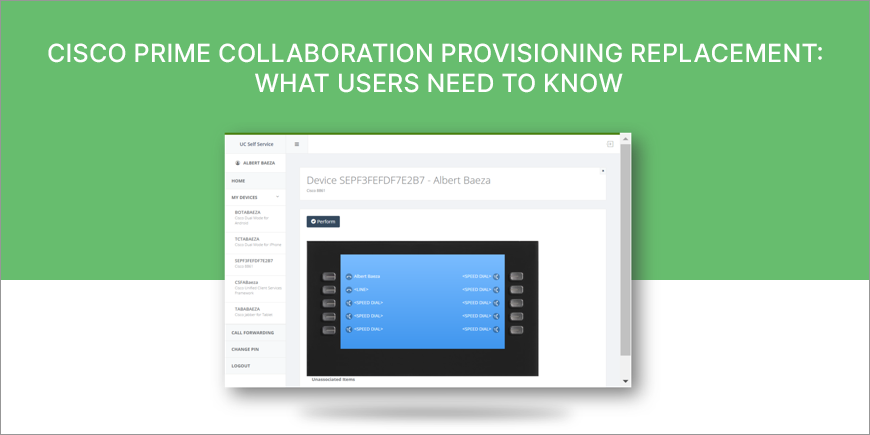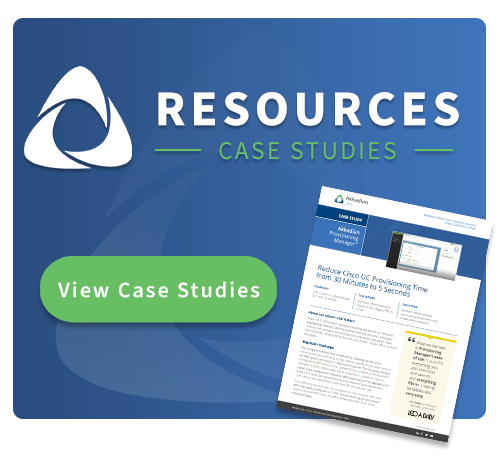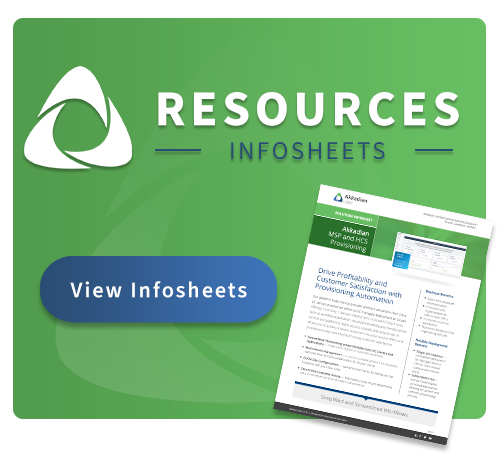Cisco has announced plans to discontinue its Cisco Prime Collaboration Provisioning (PCP) product. If you have not already, you need to start considering alternatives. We put together this brief overview to help guide your way.
We cover all the major questions you may have about Cisco ending Cisco Prime and provide a viable solution to Cisco Prime Provisioning: Akkadian Provisioning Manager—the industry-leading platform for full-cycle, zero-touch provisioning automation.
What is Cisco Prime Collaboration Provisioning?
Cisco Prime Collaboration Provisioning (PCP) is a web-based solution that helps enterprise clients manage their CUCM services. PCP manages IP communication endpoints and services in an integrated IP telephony, video, voicemail, and unified messaging environment.
Cisco has announced plans to discontinue its Cisco Prime Collaboration Provisioning (PCP) product. If you have not already, you need to start considering alternatives. We put together this brief overview to help guide your way.
We cover all the major questions you may have about Cisco ending Cisco Prime and provide a viable solution to Cisco Prime Provisioning: Akkadian Provisioning Manager—the industry-leading platform for full-cycle, zero-touch provisioning automation.
What is the Timeline for Cisco Prime’s End-of-Life?
On April 16, 2021, Cisco first announced the end-of-sale and end-of-life for Cisco Prime applications, including:
- Cisco Prime Assurance and Analytics
- Cisco Prime Assurance and Analytics for HCS
- Cisco Prime Prime Collaboration Provisioning
These solutions will be sunsetted without plans for a replacement, so finding new solutions is up to the individual companies that use them.
Cisco also outlines the timetable for the EOL process. Milestone dates are in the chart below.
| Milestone | Definition | Date |
|---|---|---|
| End-of-Life Announcement Date | The date the document that announces the end of sale and end of life of a product is distributed to the general public. | April 15, 2021 |
| End-of-Sale Date: App SW | The last date to order the product through Cisco point-of-sale mechanisms. The product is no longer for sale after this date. | October 14, 2021 |
| Last Ship Date: App SW | The last possible ship date that can be requested of Cisco and/or its contract manufacturers. The actual ship date is dependent on lead time. | January 12, 2022 |
| End of SW Maintenance Releases Date: App SW | The last date that Cisco Engineering may release any final software maintenance releases or bug fixes. After this date, Cisco Engineering will no longer develop, repair, maintain, or test the product software. | October 14, 2022 |
| End of New Service Attachment Date: App SW | For equipment and software that is not covered by a service-and-support contract, this is the last date to order a new service-and-support contract or add the equipment and/or software to an existing service-and-support contract. | October 14, 2022 |
| End of Service Contract Renewal Date: App SW | The last date to extend or renew a service contract for the product. | January 10, 2024 |
| Last Date of Support: App SW | The last date to receive applicable service and support for the product as entitled by active service contracts or by warranty terms and conditions. After this date, all support services for the product are unavailable, and the product becomes obsolete. | October 31, 2024 |
What does this EOL announcement mean for PCP users?
This EOL means, once key milestone dates are reached, that PCP will no longer be available for purchase nor receive routine updates, support or any other attention from the Cisco Technical Assistance Center.
At the end of the day, that means your enterprise will be running an outdated solution that won’t be receiving any support. Of course, you could go on using PCP without support; however, that option runs the risk of future complications, including outages and possible security breaches.
If your enterprise uses PCP for provisioning and management of your CUCM environment, you should look into a new UC provisioning and management solution.
Migrating from PCP to a New Provisioning Solution: 5 Tips
The EOL announcement has been live for some time now, but if your enterprise still needs to migrate to a new provisioning solution, here are some simple tips to get started.
Tip #1: You Still Have Time. So, Take It!
While we’re getting close to the last support date, your company still has time to make a well-thought-out migration plan.
Before rushing headlong into a solution that may not be right for your business down the line, you should take stock of your UC environment and any goals that your company may have. Making the switch from PCP to another provisioning solution is a great time to also plan out a migration to more agile cloud-based UC solutions.
Tip #2: Consider Other UC Platforms
PCP migration is also a good opportunity to examine your entire UC environment. Many companies have switched to cloud-based solutions or a hybrid of on-prem and cloud.
Thanks to modern provisioning solutions, that switch is now made easier than ever thanks to native connections to new leading cloud platforms like Zoom, Teams and Webex.
Tip #3: Automate!
It’s important to go beyond the migration project and consider a provisioning solution that can help you automate many of the routine, manual provisioning tasks that day-to-day management involves.
Everything from routine MAC-Ds to full bulk provisioning jobs can be migrated across a company’s UC tech stack. Automating these processes makes them faster and more consistent, allowing your teams to focus on higher-priority strategic initiatives.
What should enterprises look for in another provisioning solution?
As you look for your replacement for PCP, it’s critical to prioritize ROI through automation.
Even with PCP, CUCM provisioning has been a rote, mostly manual task that takes too much of your highly-trained UC engineers’ time.
An automated UC provisioning solution like Akkadian Provisioning Manager can help companies see ROI through time and resource savings that allow those UC engineers to focus on strategic projects.
With an automated provisioning, role-based access and directory management solution, your organization can expect benefits like:
- Full-cycle, zero-touch provisioning to ensure the entire user provisioning process is automated
- Job templates that allow for consistent work, whether it’s migrations or bulk provisioning
- Role-based access to allow HelpDesks to make changes easily, outside of Cisco applications, reducing outage and security risks
- A self-service portal allowing end-users to make simple changes, like voicemail PIN resets
Cisco Prime Collaboration Provisioning Replacement: Akkadian Provisioning Manager
Akkadian Provisioning Manager is more than a PCP replacement. It can remove a lot of the process time around provisioning and managing a CUCM or hybrid environment. It empowers UC engineers to fully automate provisioning tasks within CUCM and beyond to other related enterprise applications.
If your organization plans to migrate from PCP, then Akkadian Provisioning Manager can be a simple, flexible way to help your organization achieve the modern UC environment that keeps your employees connected everywhere they do business.
Interested in learning how APM can help your organization? Get in touch to schedule your 10-minute demo.



